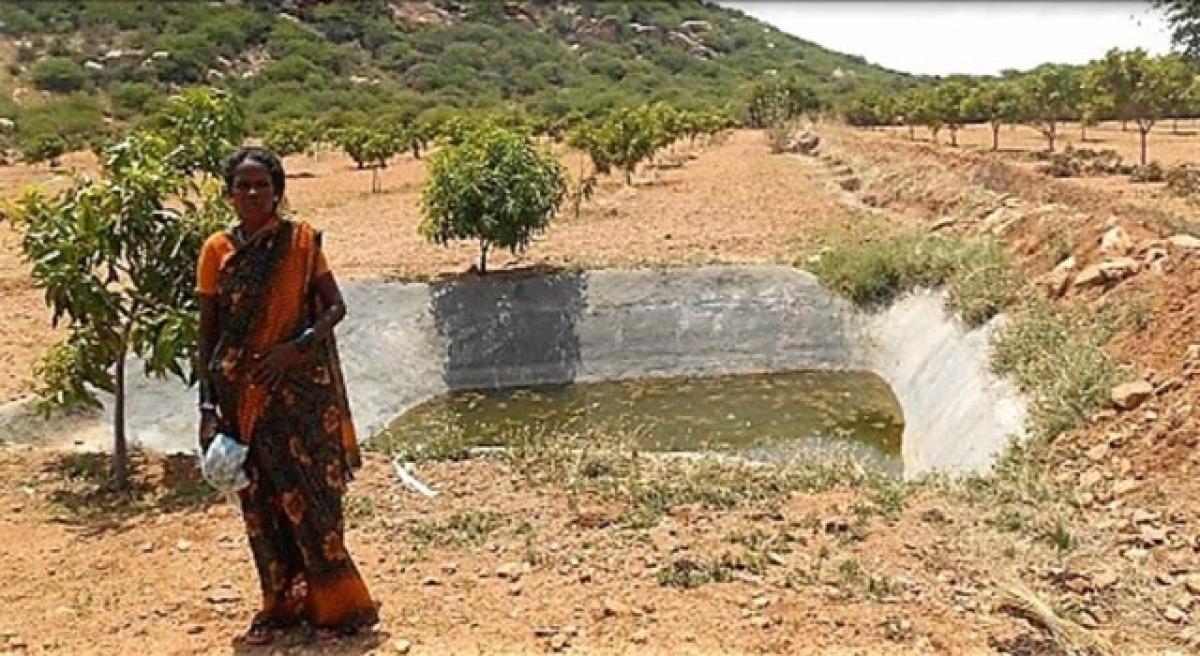Live
- HCLTech launches TechBee
- Industrial growth recovery expected in H2
- No arrests made yet, says Police Commissioner
- Bhupalapally: 22 selected for kabaddi tournament
- Safiya awarded PhD
- School for brick kiln workers’ children opens
- ISRO: A digital bridge and global diplomatic force
- Devanahalli toll plaza collects `308 cr in a single year
- Indiramma house survey conducted
- Alphores Narender Reddy donates Rs 1 lakh to library
Just In

As the day dawns in Hulikallu village in Kalyandurgam mandal, Ramakka would stare at empty pots and empty dishes in the kitchen. Virtual starvation was staring at them. Life is all about struggle for survival. Empty barren lands with no water and plantation would mock at them. There was no scope for further borrowing as already they landed in whirlpool of debts.
Hulikallu (Anantapur): As the day dawns in Hulikallu village in Kalyandurgam mandal, Ramakka would stare at empty pots and empty dishes in the kitchen. Virtual starvation was staring at them. Life is all about struggle for survival. Empty barren lands with no water and plantation would mock at them. There was no scope for further borrowing as already they landed in whirlpool of debts.
With no avenues of family support Ramakka and her husband could not make both ends meet and many times ended up consuming ragi (millet) malt as food only once in a day skipping breakfast and dinner. Ramakka’s story is a reflection of conditions in her village and that of other Hulikallu village folk, two years ago. She has a son and daughter to care for. Many a time they barely fed their children depriving themselves of food.
The sight of her two acres of barren land full of nut grass, steep undulations, pebbles and boulders bothered her and her husband. Both she and her husband used to attend farm work when it is available, and during the lean work season her husband migrated to other places for as long as 3 to 5 months for earning a pittance as an unskilled labourer.
The family lived under social and psychological pressure all the time with mounting debts. However things began to change for good with the government department DWAMA issuing a job card which guaranteed 100 days of wage employment in a year. “My husband and I now found a flicker of hope in NREGS work. Ramakka says that the family earned between Rs 12000 to Rs 18000 per year under this programme.
They successfully completed 100 days of wage employment in the just concluded financial year. NREGS gave hope and new direction and dimension to their otherwise shattered life. The couple graduated from no work to assured work. While the assured wage employment under MGNREGS continued, another opportunity to develop their barren land came their way with the introduction of PMKSY programme converging with MGNREGS and NTR Jala Siri, a State government scheme, in the village.
The Ramakka and husband duo was identified as one in the group of scheme beneficiaries and are sharing water from the irrigation bore provided by Government. With assured water from a government dug bore-well, they had taken up horticulture mango crop in their 2 acres of land under MGNREGS and to further boost their income they had taken up groundnut and tomato as intercrops.
The family planted 140 mango plants in their 2 acres of land. Additional financial benefits like payment of Rs 2000 per acre for watering the plants under NREGS labour component added to their blessings. “We have spent the money judiciously for fetching additional water through tanks and also to meet domestic expenditure”, said Ramakka.
“We spent most of this for hiring water tanker to water the plants, and a part of it is used for domestic purpose and repayment of petty loans. Under the guidance of the government officials the couple ensured 100% survival of plants. The mango harvesting also gave them a yearly handsome income to them. The income of the crop was used to pay off their debts.
This year they have dug their own bore-well in their land. This bore helped them to further expand by taking up vegetable cultivation including brinjal, tomato, and groundnut. This gave the family an additional income of Rs 20,000 during the present year.
From a pathetic condition of starvation to finding work and development of their own land, the couple climbed the ladder of success, thanks to the timely intervention of the district administration; the village experienced a social and economic transformation.
By Ravi P Benjamin

© 2024 Hyderabad Media House Limited/The Hans India. All rights reserved. Powered by hocalwire.com







